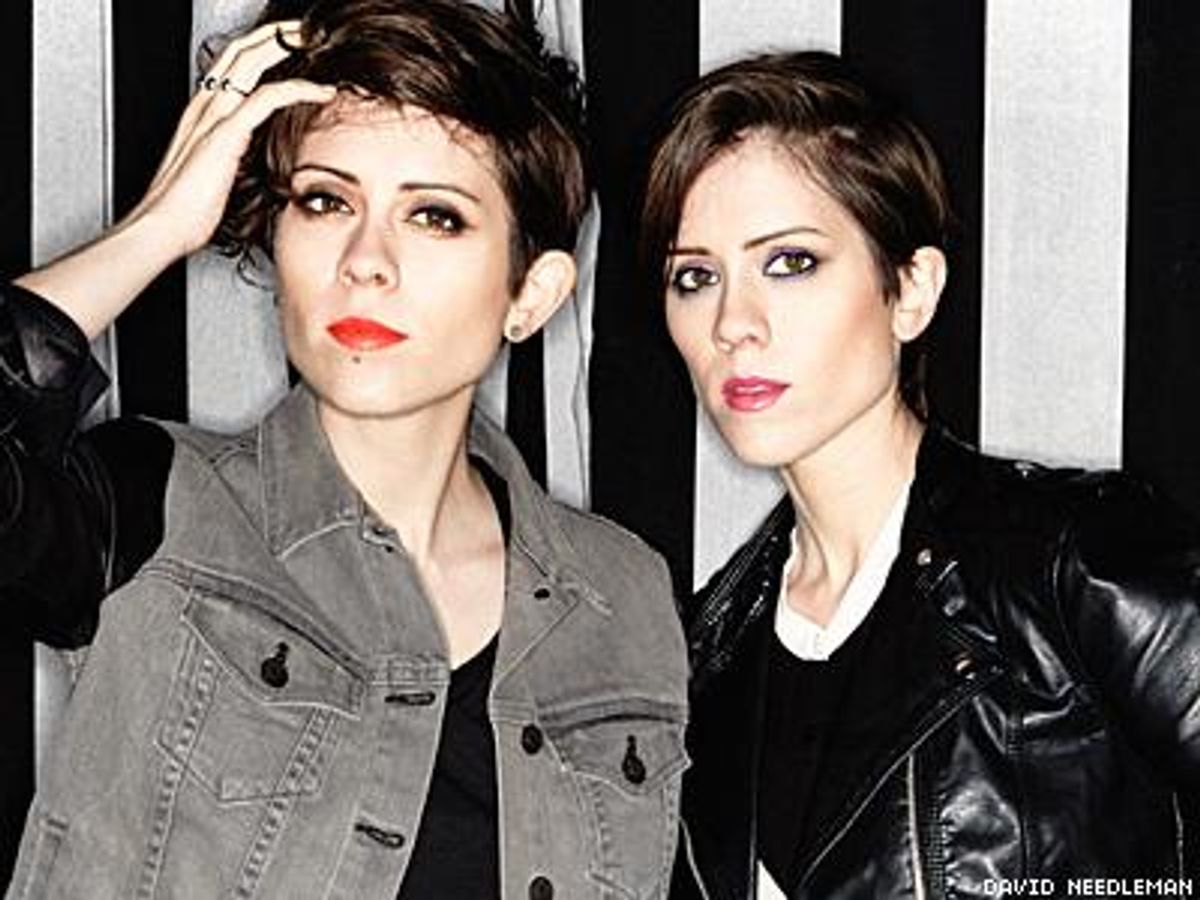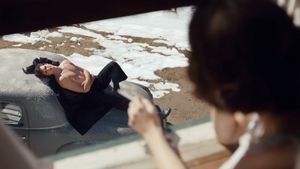
"I think it's such a cool issue, 40 Under 40," says Sara Quin. "That's how old my mom was when we graduated high school. When I was younger, I thought that 40 was when you had it all figured out. You're not over the hill, like you're going to die, but that seemed old to me. Now we're seven and a half years from being the age my mom was when we graduated high school. It's astounding to me."
The twin sisters from Western Canada are seasoned pros at 32. Tegan and Sara Quin have been known to many queer and folk/indie rock fans for over a decade. In fact, they've been writing music a full half of their lives now. They were signed to a record deal at the tender age of 19.
"Now I guess 40 for me is like 50 -- that's what I'm thinking," Sara continues. So 50 is when one is a fully formed adult?
"Maybe that's the lesson here," says Tegan. "That you're never a fully formed adult."
The night before the interview, Tegan and Sara finished a two-night set of shows at New York City's Beacon Theatre. They'd just started a tour for their seventh album, Heartthrob, a pumping, synth-driven chart-topper that is a departure both in style and ambition for the duo.
"When I pitched the idea of Heartthrob, we did talk a lot about how fun it would be to appropriate 'heartthrob,' which is generally attached to males, for ourselves," Tegan says. "Our first loves are heartthrobs -- we obsess over something that isn't real."
For Tegan and Sara, those first loves were shared by a zillion grade school girls: New Kids on the Block. "We were like, We want a piece of them," Tegan says.
"We had all of the memorabilia and the sleeping bag and the slap bracelet and the music," Sara says. "I loved Joey [McIntyre] and Tegan loved Jordan [Knight].... That was probably the beginning of knowing that the girls that I was friends with, they wanted to kiss Joey, and I wanted to look like Joey."
"But no," Tegan interjects, "our record's not really about Joey McIntyre from New Kids on the Block."
It's really not about Joey or Jordan. Both women are openly lesbian. At age 19, Tegan and Sara were signed to Vapor Records, the label run by Neil Young's manager, Elliot Roberts. As soon as the press requests came in, Tegan and Sara, both of whom were out to their families, had to contend with being out publicly.
"We had never done interviews before, and a lot of the interest that we were getting was from gay magazines," Sara says, "I remember I felt homophobic. I felt insecure. Like, Oh, my God, should we talk to these people? Are we allowed to be gay? Is that a decision we're going to have to make right now?"
"People were either asking if we were gay, or 'Do you have boyfriends?' " Tegan recalls. "What are you supposed to say? 'So, you're writing about your boyfriends?' And we're like, 'Not really.' I think we'd been signed a month."
EXCLUSIVE VIDEO: The chart-topping heartthrobs sit down for an exclusive interview at the start of their tour for Heartthrob to talk about New Kids on the Block, the resurgence of rave, and what it was like to be openly gay from the very start of their professional careers at age 19.

Then came a very illuminating conversation with Roberts. Tegan says, "We were almost asking for permission from him, like 'Is it OK? Are we going to hurt our career?' " She says Roberts's advice was formative. "It's so significant to me now to look back at that moment because what Elliot said to us could have steered us in a very different direction. He just said, 'Be yourselves. If you're gay, you should be comfortable, you should talk about yourselves. These are your experiences and your stories and your songs. And being authentic and being transparent with people is what's going to connect them to you.' And so off we went.... I'm so glad that Elliot said that, because if he had said, 'Let's play that down, let's get you on dates with Tobey Maguire and Leonardo DiCaprio,' I actually probably would have been straight then, if he'd said that."
The duo fully embraced the advice and have been out since that early point in their careers. Tegan continues, "I hate when [journalists] start a conversation with me where they say, 'People are always talking about you being gay, get over it already!' And I'm like, 'No, I don't want to get over it! You get over it yourself!' I want to be able to be gay and be a girl, and this shouldn't mean that I'm marginalized. I should be able to be a universal musician and appeal to both men and women, straight and gay."
(RELATED: Watch The Complete Interview With Tegan & Sara)
Still, the stage is for music, they insist. "Our job is to get up and play music," Tegan says. "That's why people pay to come and see us. At the same time our band is unique. People do come to hear us talk about things. There's never ever been a [political] agenda onstage, but there's also no rules. It's not like Sara and I got together and said, 'Only one gay comment tonight.' "
"As a political person who makes popular music that has nothing to do with politics," Sara says, "I think it's important to be visible and have my politics be visible in appropriate ways offstage. I don't want to make a political record, but I'm going to leave a political record offstage. That's the world that I want to live in. I don't do it all the time and I would never be reckless about my opinions, and we don't necessarily give ourselves rules, but when something's important to us we talk about it."
The band's most recent album, Sainthood (2009), was a firmly indie rock work, characterized by their plaintive vocals, lean arrangements, lots of guitar, and tons of their signature perfect hooks. "We really had found our stride in the indie rock community," Tegan says. "We were having a very gradual trajectory." But the compulsion to do something new and different was insistent.

Between albums, Tegan and Sara had seen surprising success in collaborations with decidedly non-indie rock artists, notably dance music producers DJ Tiesto ("Feel It in My Bones") and David Guetta ("Every Chance We Get We Run"). The success strongly suggested their vocals were ripe for high-energy dancehall tracks.
Consequently, writing Heartthrob felt different. It was taking shape as a sort of super record. "We were writing these really bold, pop-driven songs," says Tegan. "Sara was moving away from guitar almost completely, and I was really trying to write a great bridge, a great ballad, really trying things that I had not done well in the past, to push myself outside of my box."
With a dozen songs written they partnered with Greg Kurstin (he'd worked with Kelly Clarkson, Pink, Ke$ha), a producer who fit all their requirements: indie and pop experience, and a track record of working with female vocalists. He encouraged them to make their tracks audacious.
The Quins are queer feminist icons to devotees who've been faithful since their earliest folk-inspired Lilith Fair fare. But whatever early trepidation there might been at the prospect of alienating their longtime fans has since evaporated. They're are really good at making great, confident pop, and while they've grown in range, they haven't sacrificed their signature melancholic vocals and kick-in-the-gut lyrics. "Closer" is the near-perfect first single on the tight 10-track album, capturing the rush and dizzy anticipation of first physical contact in electric synths. "Love They Say" is a paean to true romance -- "The first time I saw your face / I knew I was meant for you" -- with sincere lyrics that in clumsier hands would sound syrupy. The superbly sensational "Now I'm All Messed Up" veers traumatically between bipolar pushes and pulls, highs and lows: "Go (please stay) / Go if you want / I can't stop you." The album debuted at number 3 on the Billboard 200 chart, and peaked at number 1 on both the U.S. Billboard Top Alternative and Top Rock Albums, and number 2 on the Digital Albums chart.
Since age 16, when they were writing alone in their bedrooms in Calgary, the sisters have mostly written songs in isolation, then sought feedback or a line of a bridge from the other -- a practice they prefer. And each takes lead vocals on her own songs. But they've inched toward writing together.
Tegan says, "Sara actually cowrote on all five of my tracks -- she wrote the bridge on three of them, and she helped me with two choruses. And because she's changed the tone or direction of the song, it really feels like all of a sudden there's a real left turn. Songs like 'I Was a Fool' and 'Drove Me Wild,' when the bridge comes in, it really feels like a different voice. I think this is something that is a big step for us. The songs have more depth, because they have two perspectives rather than just one. There's something to be said for having been the person who wrote the song -- in order to I think truly embed yourself in it, and really believe in it.... When I sing 'How Come You Don't Want Me' with Sara, I am accompanying her, but it is her voice, it's her song. It's her experience."
Rather than binge on a musician or a genre while writing this album, Sara describes mostly taking a break from music for inspiration, with a notable exception. "I was listening to a lot of music that focused on falsetto and a higher range. I do have a comfortable range...but when I pushed myself outside of what's comfortable, I've ended up at a place that was really inspiring."
The Heartthrob tour includes gigs through September throughout the United States, Canada, Australia, Indonesia, and Europe, and will doubtlessly include more meetings at pop music radio stations like a recent one they describe. The station director assumed at first glance that they were 20-something novices who'd purchased a pop track. But a few minutes talking to the Quins disabuses anyone of the idea that they're ingenues.
"We're women in an industry where women who are older aren't necessarily taken seriously either," says Tegan. "There's sort of a natural trend where you see women [musicians] in their 30s drop off and have children. We really resisted [that idea] in our 20s when journalists would say, 'When you get to your 30s, are you going to have kids and stop touring?' And we were like, 'Oh, my God, why would you ask us that? Do you ask men that?' Then I got to my 30s and I thought we might start slowing down and having kids--"
Sara interjects, "It's some weird fucked-up hormonal thing. You try to fight it, but you can't."
"It is! It's biological!" says Tegan. "I think we're actually probably going against the grain right now that we're so ambitious now that we're in our 30s...but we have decided to really aim for the stars."
"Now I'm like, 'Oh, no, now I'm in my prime. You can't stop me now,' " Sara says. Both sisters express a sense of ambition coupled with a peacefulness they say comes from being in their 30s.
"Sort of by accident we fell into these adventures and achieving these astounding things that we had never imagined," Tegan says. "If I step out the door tonight and get hit by a bus, I hope everybody knows I kind of did everything that I could have possibly wanted to do. Now is just icing on the cake."
















































































